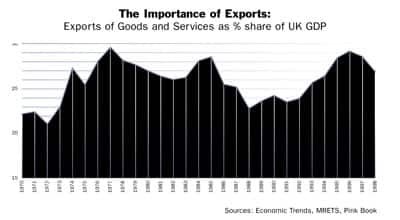
One of the biggest challenges for business organisations in the UK is learning how and where to trade overseas. In an interdependent world, international trade is an economic necessity. However, there are marked differences between trading in a national economy with known markets and known parameters, and trading on an international basis. Business organisations require support to enter markets as well as to sustain their activities. This case study looks at British Trade International and its aim to help UK firms compete successfully overseas.
British Trade International is the joint Department of Trade and Industry/Foreign and Commonwealth Office operation which has lead responsibility within the Government for trade promotion and development.

British Trade International helps businesses make the most of global trading opportunities. With over 800 staff in the UK and over 200 diplomatic posts overseas, British Trade International supplies various information, from basic advice – such as for a small business which may be a first time exporter to Dublin – to highly specific niche market information, i.e. a small specialist market.
Within the UK, British Trade International provides dedicated market support including:
- advice/information services for initial market research
- professional help from export promoters who have widespread export experience
- information on various methods of conducting business in a specific country
- help with meeting language and cultural requirements
- assistance in bringing key contacts to the UK
- helping UK organisations market themselves overseas, including grants for visiting countries and exhibiting at international trade shows.
Services tailored for each organisation’s needs are provided by British Trade International’s overseas offices, which can supply direct support for each exporter.
Marketing intelligence

British Trade International’s Export Market Information Centre possesses an extensive range of publications and statistics relating to businesses worldwide. It may be accessed in person, by telephone, fax or e-mail. Making the most of IT and the Internet is another major step in improving services to UK businesses.
A new Internet service, TradeUK, provides information on sales leads gathered by overseas offices. This is instantly fed into the system so UK companies can respond more rapidly than their competitors to new business opportunities.
UK businesses can obtain details of all the leads together with full details of five leads free every month. To access TradeUK, a business has to be part of the National Exporters’ Database. This is a free Internet-based directory of UK firms, with 54,000 exporters on it at present. Posts are able to search TradeUK to answer enquiries from potential customers, as can those with Internet access who search the database themselves. The aim of this service is to provide global exposure.
Why do UK companies export?

A presence in overseas markets will help business organisations to achieve:
- increased growth leading to the benefits of economies of scale –
- larger production runs reduce costs
- a competitive edge – exposure to intensive competition, new products and ideas, more efficient technologies and better working practices
- higher earnings where margins in some markets exceed those in the domestic one
- the ability to spread risks – while sales in the home market may be in decline those in overseas markets may be booming.
The size of the business does not matter, nor does the product sector. What is important is:
- the product meets local demands
- regular training of overseas sales teams
- developing long-term relationships
- establishing new markets to compensate for less buoyant ones
- good marketing and customer service
- having a quality product strong enough to compete within overseas markets.
Exporting success – Genesis Tilemates

The 1998 Grand Champion Export Award Winner for Smaller Businesses states, ‘Genesis Tilemates has a dedicated and thorough approach to developing new markets.‘
Genesis Tilemates manufactures products for the construction industry that add a final touch to floors and walls. A range of over 400 profiles made from PVC and metals form the primary product line, finishing off edges, minimising damage and extending the life of tiled surfaces. The Stokesley company also manufactures skirting and matching dado rails, transition strips for joining tile to carpet or for use in doorways, stair nosing and expansion or compression joints for floors.
Export earnings represent nearly 70% of the company’s annual turnover with both exports and turnover increasing by around 50 per cent over the past two years. Excluding the Americas, Genesis is exporting over 50,000 metres of trim a day and continuing to expand with new growth in the United States, South America, Africa and Japan.
Aidan Bruce, the company’s Managing Director, explains how he first became an exporter:
‘The company was launched in 1989. The following year, I bought space at an exhibition in Miami and showed my first products to potential clients. At that one show, I picked up orders from customers in seven countries on the other side of the Atlantic. “After repeating this initial success at a number of other shows, I quickly arrived at the inescapable and rather obvious conclusion that the ability to export hugely expands your potential client base. Naturally, there are a host of export issues that need to be addressed, but I know from experience that restricting yourself to the UK limits your potential growth.
‘I’ve been exporting for eight years now and I’ve learned an enormous amount in that time. You need to be very professional in your approach and it is essential to build your knowledge and understanding of each individual export market. That means a great deal of hard work researching and visiting overseas countries but the potential rewards for smaller businesses can be amazing if you’re prepared to put in the effort to start with.
‘Personal relationships are also important. We build a strong rapport with each of our distributors, operating a ‘sale or return’ system with our most trusted associates to help establish new product lines. This way they can promote products to their customers knowing that they can return any unsold stock to us without having to pay for it. This is only possible where there is a relationship of mutual trust.
‘It is this flexible approach to business that has made us the leading manufacturer of finishing profiles world-wide. We would never have been able to export to 76 countries without it. Obviously the strength of sterling has affected us but our methods and strong international relationships have allowed us to work round it. For instance, we usually agree an exchange rate with our customers and then invoice in the local currency.
‘We’ve been prepared to put in the effort to develop our presence in new markets. Our success in South Africa is due to our establishment of a local subsidiary company to tackle the market aggressively. Our competitors suffer because they haven’t been prepared to go the “extra mile” to establish their products.’
Mr Bruce summed up his views in a few words: ‘Exporting is very hard work but it can be thoroughly rewarding if you approach it professionally.‘
Benefits of Government support

The UK is one of the world’s major trading nations. Income from the sale of goods and services overseas represents almost 30% of the UK’s Gross Domestic Product. These are the earnings generated through British organisations and their investments both within and outside the UK. Compare that with the United States and Japan, whose shares of exports in GDP terms are much lower at around ten per cent each.
The term ‘exports’ now takes on a much broader meaning than in the past. It includes both receipts from the sale of goods and payments made for the sale of services. It places financial services, for example, alongside major and successful manufacturing sector exporters. Services now comprise about a quarter of total exports. Income also comes from substantial overseas investments made by UK firms.
Practical advice
British Trade International does not win orders for UK businesses, but it does provide information that allows businesses to succeed internationally. Some organisations encounter many problems in getting accurate information about opportunities in particular markets. They also want to know the best ways to take advantage of them. The Government helps through British Trade International. Britain’s image overseas as a desirable trading partner is significant as it helps to create a climate in which UK firms can secure important business opportunities.

British Trade International aims to give British business organisations a real edge in world markets by bringing together national, regional, local and international operations under one single strategy.
Access to British Trade International’s services is through Business Links in England, and Scottish Trade International, National Assembly for Wales and Trade International Northern Ireland in the respective devolved administrations. Export Development Counsellors are situated in a number of Business Links. They offer specialist advice on international trade and especially help develop export strategies.
British Trade International provides a range of advice – from start-up information, to innovation and technological services. There are many other services, some of which are tailored to the needs of groups of customers. The services are extensively used. For example, over 10,000 companies are supported at international trade shows, annually.
British Trade International is advised by over 200 senior UK businessmen on its strategy. Work is ongoing to ensure the services match the needs of the customers. Recent initiatives include the Export USA programme which aims to help new, inexperienced exporters offering innovative products or services to access the US market. Key elements of this programme are:
- one-on-one mentoring from Commercial Officers at Posts
- a market assessment
- a short marketing course at a business school
- funding of an air ticket to a relevant trade fair or conference.
For new exporters, there is an export initiative for Western Europe. The Export Explorer package will allow new exporters to undertake prepared visits to some accessible markets and trade fairs in Western Europe for £99.00 plus travel and accommodation.
Trade Policy Directorate
Without open overseas markets, our businesses could not export the top quality goods and services for which Britain is renowned. One major addition to this export promotion work is the role of the Trade Policy Directorate of the DTI. Businesses should be able to trade without facing high tariffs, discriminatory regulations or unnecessarily burdensome procedures.
Removing the trade barriers which limit their performance is important for British exports. The Trade Policy Directorate presses for the removal of trade barriers through the European Union and through the World Trade Organisation’s dispute settlement system. Its role in enabling firms to achieve international sales must not be overlooked.
Conclusion

Overseas trade is fundamentally important for British businesses and the British economy. The economic benefits of entering other markets outweigh the disadvantages and risks, regardless of the size of the trading organisation.
The assistance British Trade International gives to UK businesses in international trade is vital. It maintains a hold on these risks and helps to anticipate ways of working through difficulties.
